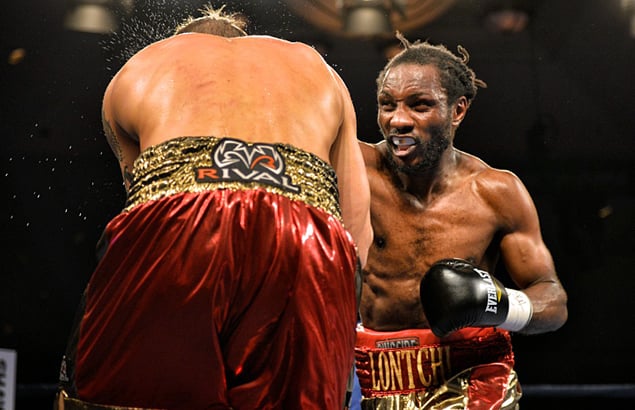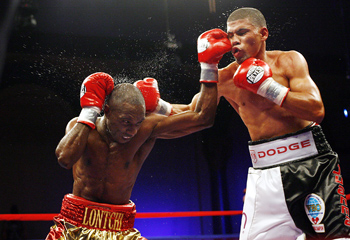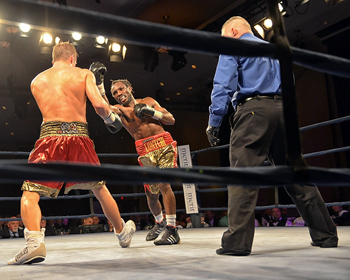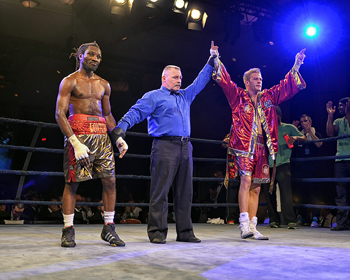‘$500 On the Black guy:’ Olivier Lontchi’s anonymous return


Uncertainty and expectation are the joys of life. – William Congreve
Olivier Lontchi walks into the room slowly, his hands tucked into his jean pockets impeding him from speeding up. His trainers, Otis and Howard Grant, head straight for the ping pong table in the middle of the Fight Network offices and begin to play a game amidst a handful of employees going about their daily business within their cubicles.
The Grant brothers are already trading verbal barbs, reminiscing about how good they once were at table tennis, quickly gathering the attention and laughter of everyone nearby. Their pupil, meanwhile, is quietly trying to avoid it.
“Could I please have a tissue?” Lontchi whispers, having taken his hands from his pockets and folded them in a pleading fashion. “I get so stuffed up when the weather changes.”
Of course, as a professional prizefighter, he can effectively take whatever he wants from whoever he wants. But from Lontchi, the question seems to be more than just a courteous formality. There is a genuine shyness, bordering on subservience that emanates from him.
 If there is an air of uncertainty in the room, it is understandable. Lontchi was last seen in the ring in 2010, when he was stopped by RING featherweight champion Mikey Garcia. Prior to that, he headlined a Top Rank pay-per-view card against then-junior featherweight titleholder Juan Manuel Lopez, whom he fell to in nine rounds. That means that his last win came nearly four years to the day, a seventh-round knockout of journeyman Cecilio Santos.
If there is an air of uncertainty in the room, it is understandable. Lontchi was last seen in the ring in 2010, when he was stopped by RING featherweight champion Mikey Garcia. Prior to that, he headlined a Top Rank pay-per-view card against then-junior featherweight titleholder Juan Manuel Lopez, whom he fell to in nine rounds. That means that his last win came nearly four years to the day, a seventh-round knockout of journeyman Cecilio Santos.
Tomorrow, he will return against featherweight prospect Tyler Asselstine in an eight-round Tuesday night bout in Toronto, Ontario.
The time away from the ring had nothing to do with “politics” or injustice whatsoever. Rather, following the loss to Garcia, he decided to walk away from the sport entirely at the age of 27 for very simple reasons.
“When I fought in the U.S. the last time, I got injured. So I decided to take off. I lost the motivation. I wanted to stop. I can say years ago, I really wanted to stop,” says Lontchi.
He speaks with a thick Cameroonian and French accent, and admits he’s a bit nervous about answering questions in English. However, due to the language barrier, he’s unlikely to offer phony answers or clich├®s. It makes him more honest. He is deliberate, constantly thinking of the appropriate word. Amidst that struggle, he has no time to try to trick youÔÇöthat would only make things more difficult.
Walking away from the sport cold turkey is something his good friend Herman Ngoudjo did right around the same time he did. The two had basically come to Canada together in 2001, and had been pals and training partners ever since. But following a loss to Juan Urango in 2009, then Julio Diaz in 2010, he made it known he wouldn’t be around at the gym anymore.
“I went up to him after the Urango fight, and his jaw was, how do you say it? Swollen? And I said you’ll be okay. He looked at me and was like, no,” said Lontchi, impersonating Ngoudjo’s deadpan stare. “Then after that last fight in the U.S. when he lost, I went to him and said it’s okay, you’ll be back training soon. He said, ‘train for what?'”
Lontchi followed suit. He maintained a job as a security guardÔÇösurely, one of the world’s smallest, but most potentially dangerous. Capable of making anyone run for the tissue box, you might say. As one might expect upon meeting him though, he is far from the typical meathead bouncer looking to starch intoxicated folks at the drop of a hat
“Last week, a guy came to me and was like, imagine this, a big guy like me, maybe 240 pounds, and he was like, if a big guy like me comes and makes trouble, what are you gonna do? And I was like, why would you want to make trouble? I’m too small. Why would you want to fight with me? Most of the time, I just try to talk,” says Lontchi.
For the better part of two and a half years, he only went to the Club L’Espoir boxing gym from 4:00-7:00 as a mentor to at risk youths. He helped Montreal police officer Evens Guercy set up a program for students at the St. Michel High School, which sits in perhaps the city’s roughest neighborhood.
“I also teach them about life. In my country, we don’t have those kinds of programs. Maybe one day I will go back and start that kind of program, but right now, kids don’t have that,” says Lontchi.
It was another charitable mission of sorts that led him back to competing himself. The 29 year old began appearing at the Grant Brothers Gym again in late 2012, after a half-hearted return attempt in 2011 under Banner Promotions. By 2013, he was having more serious thoughts of returning, so when Otis and Howard asked if they could help prepare Baha Laham to fight Asselstine in February, he obliged.
Laham wound up handing Asselstine his first professional loss. Looking to bounce back, Asselstine’s promoter Hennessy Sports sought out Lontchi for a fight in the prospect’s hometown. Knowing they had already crafted a game plan to defeat Asselstine once before, and believing Lontchi had a skillset to carry out another one, the Grant brothers jumped to make the fight happen.
“If my kid touches anyone on the chin, it’s over. Two of the nastiest knockouts I’ve ever seen, I’ve been in my kid’s corner. When he knocked out Jason Adams in Edmonton, he was out for like five minutes,” said Howard Grant. His kid has reached playground legend status in Canada for his punching power. (Rumor has it he knocked out 170-pound UFC star Georges St. Pierre in sparring, one which Grant denies, perhaps because GSP is the gym’s most recognizable client.)
Once again, the overt confidence of the trainers is quickly juxtaposed by their fighter.
“I really don’t like southpaws. I don’t feel very comfortable fighting them. But in the industry of boxing, you have to be able to fight a southpaw if that’s the occasion,” says Lontchi, who is facing a southpaw the very next day. “The reason why I took this fight is because the guy can fight. And I just want to come back with a good fighter. That, actually, will tell me if I’m ready to go back in the game.”
As if he realized how that just sounded though, he interrupts the natural follow-up about whether tomorrow’s fight could potentially be his last.
“No, no no no no! Doesn’t matter what happens tomorrow, I’m going to continue my career. I’m just 29 years old. I still have at least four years before I decide to retire,” he said.
As the trio packs up to head back to the Strathcona Hotel, talk moves to where everyone is going for dinner. No meal discussion around a boxer is ever more than one sentence away from a mention of the scale, particularly when the subject is 24-hours from a rare same-day weigh-in.
“How much do you weigh today?” asks Otis, as Howard loudly pronounces that he “can’t f___ing drink” the energy drink he’d been trying to sip on.
Lontchi fiddles through a goodie bag, counting a few complimentary energy drinks of his own, then looks up to flash a “you got me” smile.
“I don’t know.”
***
The province of Ontario is one of the last places on the planet to have same-day weigh ins for boxing events. People within the sport quarrel over the pros and cons of having fighters get on the scales the day before or the day of the fight, but one thing is certain, doing it the same day of the event can cause plenty of chaos for organizers.
A commissioner holds forum in a Strathcona meeting room to discuss the logistics for a bout between Samuel Vargas and Julius Bunda, announcing that it will be contested under the Unified Rules of Boxing.
“If a fighter is knocked down three times in the same round, the fight is over,” the commissioner declares.
Most people seem unconcerned with the folly, but Asselstine’s promoter Adam Harris tilts his head back and loudly points it out. “It’s the Unified Rules, there is no three-knockdown rule.”
“Any referee that lets a fighter continue after getting knocked down three times in a round should be thrown out of the sport,” the commissioner retorts, before moving on to the next item on the agenda. Harris is flabbergasted, and simply leaves the room.
It is around this time that Lontchi and Asselstine also find out abruptly that they will not be the main event, but will be going on second. They weigh in, and Asselstine comes in at 128, while Lontchi is 124.
“I feel really, really good,” says Lontchi, unconcerned with the nonsense unfolding. “Now I just need to show the world.”
Except it certainly won’t be the world he’ll be showing. On top of the fact that the event won’t be televised, it also hasn’t been publicized anywhere. More accurately, he’ll be fighting for roughly a thousand of the wealthiest 10 percent of the population in Southern Ontario. (To put it in perspective, Wayne Gretzky is one of the night’s paying attendees.)
Most of the world doesn’t even know this type of event exists. It’s a black-tie affair run in conjunction with the Shaw Festival, an annual performance theatre gathering. Sponsors of the event or large donors are privately offered the opportunity to attend the charity event, and drop thousands of dollars for cocktails, dinner, and a side of pugilism.
It is boxing at its most exploitive. The entertainment for the night could have been Twelfth Night, jugglers or a dancing bearÔÇöit wouldn’t have mattered. Based on the setup of circular tables, fifty per cent of the venue was positioned so that their backs were to the action and their torsos leaning over their Porterhouse steaks. Those in attendance were there first and foremost because they could afford it, but really for dinner and to mingle with their friends who can also afford such things.
Certainly, the apathetic rich folks are a prominent and important part of any boxing event anywhere, but nowhere except at these events do they make up the entire audience.
“I’ll bet your table $500 on the black guy,” says one tuxedoed gentleman in the hallway during the first cocktail break of the evening, wagering roughly 18 percent of the purse of the “black guy” he’s betting onÔÇöLontchiÔÇöfor pure amusement.
With all the wagers placed, Lontchi makes his way to the ring for the eight-round tilt to no reaction whatsoever. Instead of his usual upbeat Michael Jackson entrance music, he strolls down the aisle to the peacefully mellow “Natural Mystic” by Bob Marley. “Things are not the way they used to be, I won’t tell no lie; One and all have to face reality now.”
He waits in his corner to be introduced, bouncing back and forth on the balls of his feet. He’ll have to wait a few extra moments, because the announcer first has to let everyone know that he is trained by “Howard and Otis Grant, who won the world title in 1997!” and pause for a polite applause.
Asselstine gets a bit of an ovation for being from “right here in Toronto!” but the noise dips backs down to a five star restaurant-friendly murmur. During the introductions, servers bring their second round of beer buckets, this time including a few bottles of water, aiding the guests on their road back to sobriety for Wednesday morning meetings.
When the bell sounds, the hometown fighter comes out firing a jab, taking advantage of his comebacking opponent.
 Asselstine has already decided by the beginning of the second round that he can out muscle his opponent, and pushes him back to the ropes and began to open up with left uppercuts and rights to the body. But when it looks like he might be able to continue for as long as he wanted, overwhelming Lontchi, the Cameroon native throws a left hook to the body, and one right hand that briefly staggers him.
Asselstine has already decided by the beginning of the second round that he can out muscle his opponent, and pushes him back to the ropes and began to open up with left uppercuts and rights to the body. But when it looks like he might be able to continue for as long as he wanted, overwhelming Lontchi, the Cameroon native throws a left hook to the body, and one right hand that briefly staggers him.
It is a telling sequence that illustrates the narrative of the fight. Asselstine fights with desperation, perspiration having drooped his spiky hair by the third round, as he tries to outwork Lontchi. When the two men get at all close to one another, the Torontonian grabs him or pushes him off forcefully as if he’s in a hurry to get somewhere.
Lontchi seems to wait for Asselstine to drop his hands, then try to fire big right hands. Though they land on occasion and have a visible effect, Asselstine holds on immediately preventing the next one from coming. With no noise coming from the crowd whatsoever, their staggering feet struggling for position and to remain upright sound like a stampede in the ballroom.
Having just come off his first loss to a late-notice opponent in a fight broadcast on ESPN2, Asselstine too was one step away from “Opponentville,” or from his career being “over.” Lontchi had been there and for a time, been comfortable. Asselstine fought like someone frightened to find out what that was like.
He won’t find out any time soon, as the final bell tolls, and the scores are read, 78-74 and 79-73 (twice) in his favor.
 As the words leave the announcer’s mouth, Lontchi gives a big toothy smile, and trots over to his corner with the same nonchalance as a T-Ball player unconcerned with the result of the day’s game.
As the words leave the announcer’s mouth, Lontchi gives a big toothy smile, and trots over to his corner with the same nonchalance as a T-Ball player unconcerned with the result of the day’s game.
Lontchi doesn’t go straight to his dressing room though, opting to hang out in the reception area and exchange pleasantries with some of the patrons who very well may have bet on him 20 minutes earlier.
This clearly isn’t the same man who solemnly sauntered into the room yesterday.
“Hey! How’re you doing, guy?!” Lontchi says, turning his back to the businessman he was conversing with and opening his arms for a hug.
Why doesn’t he seem the least bit upset?
“Because there’s nothing I can do. In the end, the referee has the last word,” he says, adding that he felt Asselstine should have lost at least one point for holding and pushing. “But I knew that if it went to decision, no matter how close it was going to be, that he was going to get the decision. That I knew.”
Prior to the fight, he declared that he would continue on with his career regardless of the outcome. Even in the grave aftermath of the loss, his mind hasn’t changed.
“I’m gonna go back home, take one week off, then go back to the gym because like you see, I didn’t get hit. I’m okay. I’m back,” says Lontchi, again smiling, and announcing he’ll return at either 122 or 118 pounds.
Somewhere in the ring, he decided he still wanted to be in there, for better or worse. After all, if a fighter suffers a crucial loss and nobody sees it, did it really happen?
Somewhere over the course of eight rounds, Olivier Lontchi found certainty.
Photos / Blair Diamond, Chris Farina-TOP RANK (Lopez-Lontchi)
Corey Erdman is a staff writer for RingTV.com, a host at Fight Network in Canada, and a regular commentator for WealthTV. He is a full member of the Boxing Writers Association of America. Follow him on Twitter @corey_erdman.















